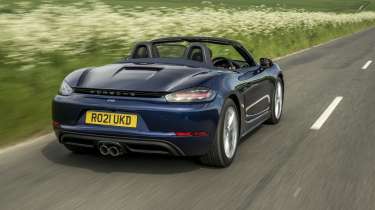Porsche 718 Boxster – engine, gearbox and technical highlights
The flat-fours are fickle engines, and manuals are geared too long. Sixes are brilliant
In the entry and S models sit a turbocharged flat-four unit which is totally bespoke for the 718. It’s been given all the latest technology to not only improve performance, but also fuel economy, with the inherent advantages of a horizontally-opposed engines thrown in, such as its low centre of gravity and compact packaging.
The entry-level 2-litre unit in the standard 718 Boxster (and closely related Cayman) produces 296bhp at a lofty 6500rpm and 280lb ft of torque at 1950rpm; this is what changes the character of the 718 so acutely in comparison to its six-cylinder predecessors.
> Porsche 718 Boxster S 2025 review – fewer cylinder, less fun
Compared to the standard car, the S gets an extra 509cc and a variable-geometry turbocharger. With the intention of generating crisper responses, the VTG turbo attempts to negate the natural reduction in response with mixed results. These upgrades unlock a more generous 345bhp and 310lb ft of torque, all available at the same rpm points as the standard 2-litre engine.
Both gearboxes are the same as in the previous Boxster, which is no bad thing, as the six-speed manual is a slick and polished companion. The seven-speed PDK is amongst the best dual-clutch units on the market.
More reviews
But, and there was always a but coming, it is not just that the scintillating flat-six has been dropped for a smaller unit which has caused us so much angst, but the fact the engines aren't well suited to the car as a whole. The standard 2-litre Boxster suffers when it comes to response as the turbo does take a moment to wake up and provide its boost. It's also a but gruff and unrefined, and doesn't relish being stretched to the redline like the best turbocharged engines do.
The Boxster S’s variable-geometry turbo does a better job of sharpening up throttle response, but suffers the same issues. The immediacy of the PDK gearbox does not compute with the torque-rich characteristics of the new engine, giving you the impression that Porsche’s calibration is not quite right.
The new engines are also completely devoid of charm, sounding like a cross section of various flat-four-engined cars, none of which Porsche would appreciate being associated with. The sound doesn’t improve under load or when the roof is lowered either, robbing the entire driving experience of a critical part of what has always made six-cylinder Boxsters such intoxicating sports cars.
Things are different with the six, though. The 4-litre flat-six is based on the turbocharged unit from base 911s, only with an extra litre of swept capacity and the removal of its two turbochargers. This refreshingly low-tech modification might sound a little ham-fisted, but it’s not, because despite layer upon layer of gas particulate filter and some very long gearing, it’s still a fantastic example of the iconic Porsche flat-six.
It’s far less extreme than the 4-litre unit in the latest GT3, and will only rev to a conservative 7200rpm, but it shares a level of precision and detail to the way it responds with its bigger siblings. The GTS isn't particularly quick in a straight line, yet the long gearing – and the spine-tingling noise up high in the rev range – will have you touching big speeds more often than you realise. The engine is so perfectly synchronised with the rest of the dynamic package that it makes for a captivating experience, commanding your full attention and integrating you into the drive like the final cog inside a precision timepiece.




